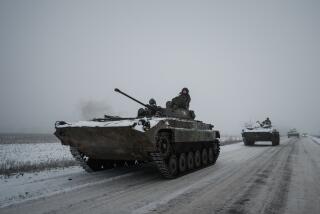Russian Urges ‘Strong,’ but Not Unilateral, Bosnia Steps
- Share via
WASHINGTON — Russian Foreign Minister Andrei V. Kozyrev warned Sunday against unilateral action to end the war in Bosnia and called for exploring new options that he said should be “very radical and strong.”
Expressing concern that the conflict between Bosnia’s Serbs, Muslims and Croats could grow into a larger Balkan war, he said new consultations between the United States and Russia are required because “we are choosing between bad and worse, or very, very bad.”
Meanwhile, Sen. Joseph R. Biden Jr. (D-Del.), a member of the Senate Foreign Relations Committee just back from Bosnia, called for a greater U.S. role in the efforts to end the yearlong war, including air strikes on Serb artillery positions that have trapped the Muslims.
With President Clinton reviewing the options and likely to announce a new policy within days, Biden said that “air strikes can take out the artillery that is the thing that is killing and massacring tens of thousands of innocent people.”
Clinton’s advisers have been divided about the wisdom of stepping up U.S. involvement. Gen. Colin L. Powell, chairman of the Joint Chiefs of Staff, has said that 500,000 ground troops would be required to end the war and enforce peace.
Others, including Madeleine Albright, the U.S. ambassador to the United Nations, and 12 State Department experts who urged Secretary of State Warren Christopher to recommend military action, have argued in favor of air strikes.
Speaking of the dilemma Friday, Clinton said at a news conference: “If the United States takes action, we must have a clearly defined objective that can be met; we must be able to understand it, and its limitations must be clear.”
Asked about the potential that the fighting could spread throughout the former Yugoslav federation, Kozyrev said “there is potential also for international crusades, be it Muslim or Christian or whatever. It is (an) extremely dangerous situation.”
Speaking from Moscow on the CBS News program “Face the Nation,” Kozyrev added: “New steps should be taken, very radical and strong steps, and that’s why I think it is (a) very timely debate which is going on elsewhere. But it is also extremely important to keep together and not to do anything totally unilaterally.”
Following Kozyrev on the same program, Biden said the goal of an increased U.S. role would be to bring an immediate halt to the “genocide” taking place in Bosnia, while forcing the Serbs to join international negotiations aimed at ending the war.
“If nothing changes, they’re not about to go to the table,” the senator said.
Asked how the United States could avoid finding itself in a Vietnam-like trap if it enters an intractable conflict in a region that, topographically, favors the Serbs, Biden said: “Our military people told me they had photographs of the artillery that was causing the damage and that they could take that artillery out like that. Bang!”
While the debate continued in Washington and Moscow, the European Community stepped back from a plan to use military force in the arena. But, during a two-day meeting in Denmark, the foreign ministers of the community’s 12 member nations decided to name a senior official to coordinate efforts at enforcing sanctions against the rump Yugoslav federation--Serbia and Montenegro--and increasing from 68 to 135 the number of people monitoring adherence to the U.N.-imposed embargo.
More to Read
Sign up for Essential California
The most important California stories and recommendations in your inbox every morning.
You may occasionally receive promotional content from the Los Angeles Times.













